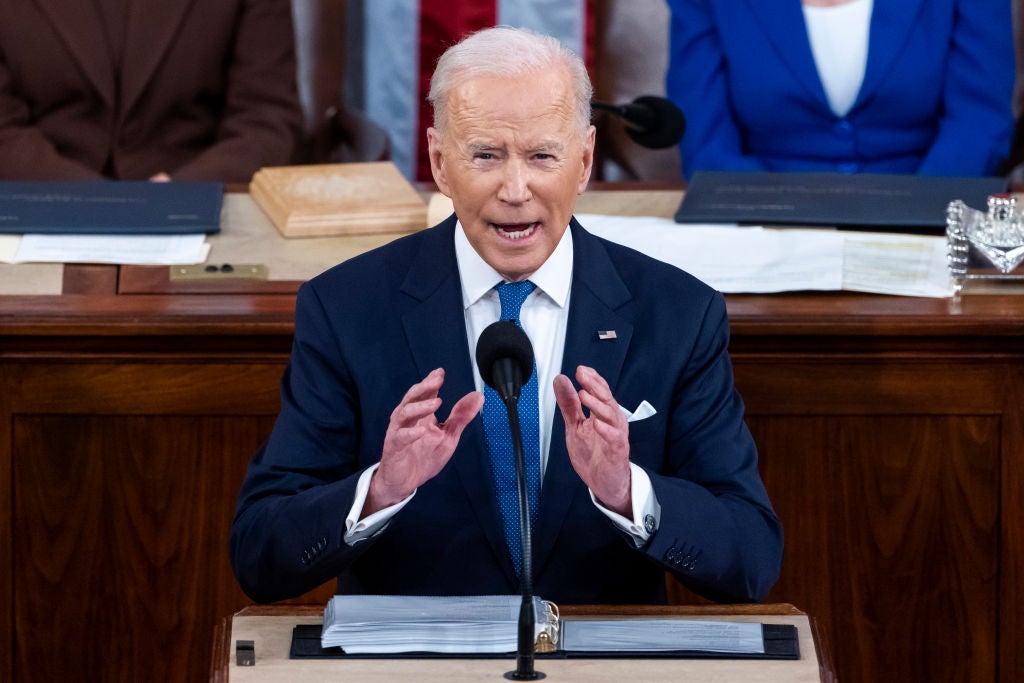Much of President Biden’s climate and clean energy agenda remains stuck in the US Senate, blocked by the entire Republican caucus and a holdout Democrat, West Virginia Senator Joe Manchin.
On Tuesday night, in his first State of the Union address, Biden urged Congress to pass what he called the “building a better America” plan – a rebranded version of his Build Back Better Act. The second part of the new plan includes a package of federal clean energy tax credits. Democratic lawmakers have proposed spending $320bn over ten years on such credits in several iterations of the Build Back Better Act.

“Let’s provide investments and tax credits to weatherise your homes and businesses to be energy efficient,” said Biden. “Double America’s clean energy production in solar, wind, and so much more. Lower the price of electric vehicles, saving you another $80 a month because you will never have to pay at the gas pump again.”
An energy security opening?
In evoking consumers’ loathing of gas station fill-ups, Biden and the White House opened a potential new route to secure passage of a rebranded climate plan. Vladimir Putin’s decision to invade Ukraine is exacerbating price volatility that even before the crisis had sent oil and gas prices soaring. Could a pitch focused on energy security, paired with reducing inflation, finally get the Build Back Better Act over the finish line?
Hours before Biden’s address, Manchin called out the US’s dependence on oil from Putin’s Russia.
“Putin has used energy as a weapon to gain leverage over our European allies,” said Manchin at a committee hearing. “During this time of war, the United States is still importing more than half a million barrels per day of crude oil and other petroleum products from Russia, with imports up over 20% in 2021 over 2020.

US Tariffs are shifting - will you react or anticipate?
Don’t let policy changes catch you off guard. Stay proactive with real-time data and expert analysis.
By GlobalData“It makes no sense at all for us to rely on energy from a country that is actively engaging in acts of war against a freedom-seeking democracy – Ukraine – when we are blessed with abundant energy resources right here in America,” he added. “It is time for the administration to take strong action to unleash American energy, up to and including banning Russian oil imports at a time when they are attacking our allies.”
Fellow Democrats in Congress joined Manchin’s call to wean the US from foreign oil.
“Russia’s invasion of Ukraine has provided a stark reminder of the need to free ourselves from the need for oil and gas from countries ruled by despots like Vladimir Putin,” Senator Ron Wyden, chair of the Senate’s tax-writing Finance Committee, said in a statement. “We have been talking about achieving this goal for decades and have failed. It is time to change that.”
He added: “While our package of clean energy tax incentives is first and foremost a way to reduce drastically carbon emissions, it will also reduce energy costs and further lessen our reliance on foreign oil and gas, including from authoritarian regimes. We need to move this package as soon as possible – opposition to it is now simply a commitment to be reliant on tyrants like Putin for decades to come.”
“The reality is the way to stop buying Russian oil is to massively increase the efficiency of the US economy," Rep. Sean Casten told Politico. "Then we can not only stop buying Russian oil, but stop buying oil from a whole lot of other people."
Climate action to fight inflation
It is Manchin’s vote, in the end, that is proving most elusive for the White House to secure. Biden and Democrats in Congress share Manchin’s concern over Putin’s ability to wield energy as a weapon, but getting Manchin to say “yes” to a new Build Back Better bill will likely require that Democrats accept provisions to boost all forms of US energy production.
That still may not be enough to win over the mercurial Manchin, however. So, when the White House introduced the new Build Back Better plan in the State of the Union, the speechwriters did their utmost to tailor their pitch to just one man.
Manchin often raised the spectre of inflation during the many months Democrats lobbied for his support of the Build Back Better Act, which explains why Biden presented the rebranded Build Back Better plan as a “better plan to fight inflation”. Federal clean energy incentives in the package, Biden said, will “cut energy costs for families an average of $500 a year by combatting climate change”, providing relief for voters who now list inflation as one of their top priorities.
[Keep up with Energy Monitor: Subscribe to our weekly newsletter]
Did the new framing resonate with Manchin? It is impossible to know for certain. Manchin appears to revel in his inscrutability but he did on Wednesday signal a willingness to approve a scaled-down version of Build Back Better.
Manchin told Politico he could support a package that raises revenue via prescription drug savings and tax reform, with the new revenue split evenly between two buckets: deficit reduction and inflation in one, spending on climate and social programmes in the other.
“If you do that, the revenue-producing [measures] would be taxes and drugs. The spending is going to be climate,” he said.
There is a beautiful simplicity in decarbonisation. Every action taken to get us off fossil fuels not only makes it a little more possible to preserve a livable planet, it also denies petrostate autocrats the means to remake the world with their aggression. Putin’s Ukraine war should make it easier for politicians in the US and beyond to embrace the freedom and security that come with climate action.





